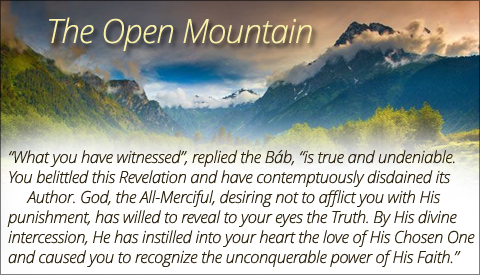 |
 |
|
PART SEVEN August 28, 2019 THE OPEN MOUNTAIN Not long after the Báb’s proclamation in the Vakil Mosque, the governor watched incredulously as the Báb’s star burned even brighter among the people. “I swear by the imperial crown of Muhammad Sháh that this very night, I shall have the Siyyid-i-Báb executed together with His wretched companions! By this act, I shall have destroyed a heresy whose survival poses the greatest menace to the interests of the State.”  The Báb and his companions were then arrested at His uncle’s home. He accepted events in His life as He always did, with great dignity and calm, but as they were being escorted under guard, He kept repeating the same verse from the Qu’rán: That which they are threatened is for morning. Is not the morning near? Soon the guards witnessed people running about in great fear and shrouded bodies being carried in the streets. A cholera epidemic had broken out. Confused, the constable in charge made his way to the governor’s palace only to find he had fled with his family, leaving only dying servants behind. Dread was growing his heart like a mighty tree as he led the Báb to his house, where he found his family weeping over his dying son. “I adjure You, by Him who has elevated You to this exalted position, to intercede on my behalf and to offer a prayer for the recovery of my son. Punish him not for that which his father has committed. I repent of what I have done, and at this moment resign my post. I solemnly pledge my words that never again will I accept such a position even though I perish of hunger.” The Báb, who was performing his ablutions for dawn prayers, told the constable to take some of the water He had washed his face with and have his son drink it. When the boy showed signs of recovery, the constable wrote to the governor and, tendering his resignation, advised him to let the Báb leave Shíraz peacefully, otherwise the whole city would fall victim to this plague. The cowardly governor agreed. The Báb then set out for Isfahán after entrusting his wife and mother to the care of his uncle. He would never see either of them again. When the Báb arrived in Isfáhán, He found himself under the protection of the governor there, Manúchihr Khán, whose admiration for the Báb only grew during their association. Determined to save the Báb after some 70 religious authorities in the city declared the Báb a heretic who should be executed, the governor ordered a regiment of 500 soldiers to escort Him out of the city for His protection. These soldiers gradually divided into groups and left on different missions, eventually leaving Him with 10 of his most trusted soldiers who then escorted the Báb secretly back to the governor’s home, where He remained for four months. During His stay, the Báb informed Manúchihr Khán that his life would soon come to an end, which he accepted with joy, for he was now a Bábí. After the governor’s passing, a few days later the Báb was discovered and arrested by his successor, Gurgín Khán. The Sháh, however, was eager to meet the Báb and sent out a royal decree that He should be escorted to Tehrán. There was one problem, however, and that was Hájí Mírzá Aqasí, the foolish and fearful Prime Minister to the Sháh. Once the Sháh’s tutor, his inexperience and ineptitude only brought about ruin and desolation. He amassed great wealth at the expense of others, made poor political decisions and destroyed people and lands with equal abandon. However, in the Sháh’s eyes, he could do no wrong. Hájí Mírzá Aqasí had initially paid little attention to the Báb’s claims until Vahíd, the foremost religious scholar, had become a Bábí. Although the Báb had written tablets to the Sháh asking for an audience and even offering to cure him of his lifelong affliction – dropsy – the Prime Minister secretly decided that they were never to meet. Therefore, the Báb’s trek to Tehrán was circumvented and He was sent to the cold prison fortress of Mah-Kú in the mountains of Azerbaijan. This miserable prison was named the Open Mountain by the Báb, whose followers, once they discovered His whereabouts, nevertheless made the long pilgrimage to see their Beloved. This puzzled the arrogant and brutal prison warden, ‘Alí Khán, a great deal.
|
|
|